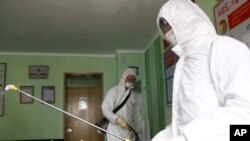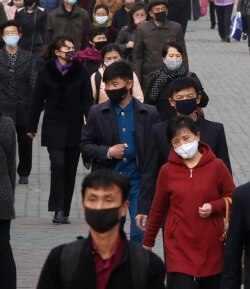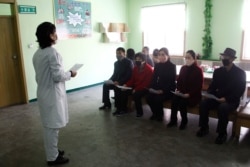Experts fear North Korea could be using its tough anti-virus measures to gain tighter centralized control over its people by prioritizing regime stability over public health.
“What I’m seeing is that there seems to be a premium placed on population control, regime-strengthening stability, and not the public health of the population,” said W. Courtland Robinson, a professor focusing on North Korea’s public health at Johns Hopkins Bloomberg School of Public Health.
North Korea has been taking tough measures to fend off the virus, even as it says the country has no cases of COVID-19. The highly contagious virus has spread rapidly from Wuhan, China, where the first cases emerged, to infect more than 2.3 million and kill nearly 160,000 people worldwide as of Saturday evening, according to the Johns Hopkins University Coronavirus Resource Center.
Pyongyang suspended all flights to and from China and closed the porous border they share in January before opening slightly in March to admit anti-virus supplies.
North Korea also placed thousands of people under quarantine before releasing some in late March. In February, the regime ordered a full inspection and quarantine of all goods arriving at its ports and borders.
Pyongyang apparently issued its strict anti-virus measures with notice of penalties for violation rather than as advisory guidelines issued for people to follow voluntarily to reduce health risks.
North Korean leader Kim Jong Un said in February that “serious consequences” will follow if the virus spreads to the country and called on everyone to obey quarantine orders “unconditionally.”
To block any incursion by the virus, North Korea emphasized in March the need for “tightening control over people to let them obey unconditionally the instructions” of anti-epidemic measures.
North Korea renewed its call to obey the orders on Tuesday, stating that complacency “can never be tolerated in carrying out preventive efforts.”
Robinson sees the regime prioritizing its ability to further control people and “not prioritizing the public health intervention.”
No indication of widespread testing
Despite its stringent anti-COVID-19 measures, North Korea has not indicated that it has begun countrywide testing, which has raised doubts as to the validity of its virus-free claim.
Ken Gause, director of the Adversary Analytics Program at CNA, a research and analysis group in Virginia, said, “[What] they’re failing to say is they haven’t tested anyone.”
“By not testing anyone, it allows them to be able to actually tell the truth that probably, strictly speaking, they have no evidence of the virus in North Korea,” he said.
Gause said North Korea might have tightened some social control measures that were in place before the 1990s, such as travel restriction requiring permits and a neighborhood watch system.
“It would be very easy to lock down the country if they wanted. All they have to do is tighten up the regulations, get rid of some of the exceptions in terms of movement, and they would be able to hold people in place,” Gause said.
He added, “If people did not follow the rules, they would pay a consequence. My guess is anybody who was found out to have the virus will be put under some sort of quarantine or strict observations, even to the point of keeping them housebound, and if they run out of food, [the regime would say] too bad.”
Travel documents
Before travel restrictions were relaxed during the 1990s famine, North Korea restricted freedom of movement by requiring documents to travel within the country. It also had a neighborhood surveillance system in which people would report unauthorized visitors and their hosts to police working for the Ministry of People’s Security and the Ministry of State Security.
Robinson said the stringent anti-virus orders accompanied by possible punishments and the lack of options for proper testing or treatment “may drive people to hide their illnesses.”
He said many North Koreans would not report the flu-like symptoms of COVID-19 for fear of being “rounded up and isolated and possibly detained in prison in ways that are not conducive to their health.”
Experts said North Korea could use COVID-19 as an excuse to try reining in “jangmadang,” the unofficial markets stocking a wide range of goods, such as food, clothing and other household items. Such a move would prevent commercial activities outside state-controlled channels.
“One of the things they may also be trying to do is to reinstitute some centralized control over the population that the markets have really taken away from the regime,” Gause said.
North Koreans became increasingly reliant on the markets that emerged in the 1990s amid a famine that left an estimated 2 million dead. People became more dependent on the markets in 2019 after the regime slashed state-distributed rations.
Gause said any restrictions on the markets would help the regime prevent people from gathering and sharing information in the marketplaces.
At the same time, the epidemic provides the regime a justification to impose tighter control over the markets as it resorts to self-sufficiency after failing to obtain sanctions relief from the U.S, he said.
In January, Kim announced that the country would focus on self-sufficiency.
'Better narrative'
“This virus could be used as an explanation of why they were cutting themselves off from the world,” Gause said. “It’s a better narrative [for the regime] to say, 'We’re protecting you from this deadly virus' than 'We’re turning our back economically on the world because our supreme leader [Kim] was unable to get a deal with the United States.' ”
Gause said, however, controlling the markets would be temporary as Kim’s vision of the economy in the future does not involve centralized regulation.
William Brown, a former CIA analyst and an expert on North Korea’s economy, said North Korea’s current desire to control the markets may reflect the economic impact it feels from closing the border with China, its primary trading partner.
“The North Korean government may try to stop the markets because [it] might be afraid of soaring prices, price inflation,” Brown said. “The North Korean government tends to stop this kind of price jump by putting a price cap on it. But the price cap destroys the market.”
After shutting the Chinese border, a move that blocked what is normally 90% of North Korea’s trade, imports from China fell to $198 million. North Korea’s exports to China dropped 75% to $10 million, Brown wrote in an article on 38 North, a website devoted to analyzing North Korea.
The figures “do not include Chinese pipeline deliveries of crude oil, which are assessed to be about 50,000 tons a month, worth $10 million to $20 million at current prices,” according to the article.
Drop in consumer goods
“What’s happened in January and February is a drop in [North Korea’s] imports of consumer goods,” Brown said. “That has more direct impact on the population.”
Fewer imports of Chinese soybeans, for example, mean North Korea could experience supply shortages and price increases.
Restricting or closing the markets could possibly lead to “pockets of starvation,” Brown said.
“If they destroy the markets, then we go back to the scenario like the ‘90s, where if there’s a food shortage, there is no mechanism for moving the food around,” Brown said. “And then you could have pockets of starvation, not whole-scale famine but pockets of starvation.”






